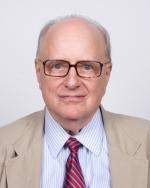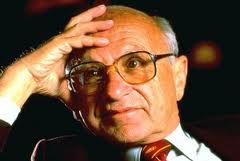Economists Sell their Souls to the Fed
April 7, 2014

Economists are the template for doctors
and all academic professions (historians etc.)
They do the bidding of the Illuminati Federal Reserve bank
directly or indirectly.
You were bought at a price; do not become slaves of men. - 1 Corinthians 7:23
All that is necessary for the triumph of evil is to offer good men good jobs. (Apologies to Edmund Burke)
by Ryan Grim
How the Fed Bought the Economics Profession (Oct, 2009)
(Edited by henrymakow.com)
The Federal Reserve, through its extensive network of consultants, visiting scholars, alumni and staff economists, so thoroughly dominates the field of economics that real criticism of the central bank has become a career liability for members of the profession.
This dominance helps explain how, even after the FED failed to foresee the [credit crash] the greatest economic collapse since the Great Depression, the central bank has largely escaped criticism from academic economists. In the Fed's thrall, the economists missed it, too.
"The FED has a lock on the economics world," says Joshua Rosner, a Wall Street analyst who correctly called the meltdown. "There is no room for other views, which I guess is why economists got it so wrong."
One critical way the FED exerts control on academic economists is through its relationships with the field's gatekeepers. For instance, at the Journal of Monetary Economics, a must-publish venue for rising economists, more than half of the editorial board members are currently on the FED payroll - and the rest have been in the past.
 Robert Auerbach,left, a former investigator
with the House banking committee, spent years looking into the
workings of the FED and published much of what he found in the 2008
book, "Deception and Abuse at the FED". A chapter in that book, excerpted here,
provided the impetus for this investigation.
Robert Auerbach,left, a former investigator
with the House banking committee, spent years looking into the
workings of the FED and published much of what he found in the 2008
book, "Deception and Abuse at the FED". A chapter in that book, excerpted here,
provided the impetus for this investigation.
Auerbach found that in 1992, roughly
968 members of the AEA designated "domestic monetary and
financial theory and institutions" as their primary field, and
717 designated it as their secondary field.
Combining his numbers with the current
ones from the AEA and NABE, it's fair to conclude that there are
something like 1,000 to 1,500 monetary economists working across the
country. Add up the 220 economist jobs at the Board of Governors
along with regional bank hires and contracted economists, and the FED
employs or contracts with easily 500 economists at any given time.
Add in those who have previously worked
for the FED - or who hope to one day soon - and you've accounted for
a very significant majority of the field.
GATEKEEPERS
The FED keeps many of the influential editors of prominent academic journals on its payroll. It is common for a journal editor to review submissions dealing with FED policy while also taking the bank's money. A HuffPost review of seven top journals found that 84 of the 190 editorial board members were affiliated with the Federal Reserve in one way or another.
"Try to publish an article
critical of the FED with an editor who works for the FED," says University of Texas professor James Galbraith.
And the journals, in turn, determine
which economists get tenure and what ideas are considered
respectable.
The pharmaceutical industry has
similarly worked to control key medical journals, but that involves
several companies. In the field of economics, it's just the FED.
Being on the FED payroll isn't just about the money, either. A relationship with the FED carries prestige; invitations to FED conferences and offers of visiting scholarships with the bank signal a rising star or an economist who has arrived. Affiliations with the FED have become the oxygen of academic life for monetary economists.
"It's very important, if you are tenure track and don't have tenure, to show that you are valued by the Federal Reserve," says Jane D'Arista, a FED critic and an economist with the Political Economy Research Institute at the University of Massachusetts, Amherst.
He and co-authors Olivier Giovannoni
and Ann Russo found that in the year before a presidential election,
there is a significantly tighter monetary policy coming from the FED
if a Democrat is in office and a significantly looser policy if a
Republican is in office. The effects are both statistically
significant, allowing for controls, and economically important.
They submitted a paper with their findings to the Review of Economics and Statistics in 2008, but the paper was rejected.
"The editor assigned to it turned out to be a fellow at the FED and that was after I requested that it not be assigned to someone affiliated with the FED," Galbraith says.
Publishing in top journals is, like in any discipline, the key to getting tenure. Indeed, pursuing tenure ironically requires a kind of fealty to the dominant economic ideology that is the precise opposite of the purpose of tenure, which is to protect academics who present oppositional perspectives.
And while most academic disciplines and
top-tier journals are controlled by some defining paradigm, in an
academic field like poetry, that situation can do no harm other than
to, perhaps, a forest of trees.
Economics, unfortunately, collides with reality - as it did with the Fed's incorrect reading of the housing bubble and failure to regulate financial institutions. Neither was a matter of incompetence, but both resulted from the Fed's unchallenged assumptions about the way the market worked.
 Even the late Milton Friedman, whose
monetary economic theories heavily influenced Greenspan, was
concerned about the stifled nature of the debate.
Even the late Milton Friedman, whose
monetary economic theories heavily influenced Greenspan, was
concerned about the stifled nature of the debate.
Friedman, in a 1993 letter to Auerbach that the author quotes in his book, argued that the FED practice was harming objectivity: "I cannot disagree with you that having something like 500 economists is extremely unhealthy. As you say, it is not conducive to independent, objective research.
You and I know there has been
censorship of the material published.
Equally important, the location of the
economists in the Federal Reserve has had a significant influence on
the kind of research they do, biasing that research toward
noncontroversial technical papers on method as opposed to substantive
papers on policy and results," Friedman wrote.
Greenspan told Congress in October 2008 that he was in a state of "shocked disbelief" and that the "whole intellectual edifice" had "collapsed."
House Committee on Oversight and
Government Reform Chairman Henry Waxman (D-Calif.) followed up: "In
other words, you found that your view of the world, your ideology,
was not right, it was not working."
"Absolutely, precisely," Greenspan replied. "You know, that's precisely the reason I was shocked, because I have been going for 40 years or more with very considerable evidence that it was working exceptionally well."
But, if the intellectual edifice has
collapsed, the intellectual infrastructure remains in place.
The same economists who provided
Greenspan his "very considerable evidence" are still
running the journals and still analyzing the world using the same
models that were incapable of seeing the credit boom and the coming
collapse.
--






